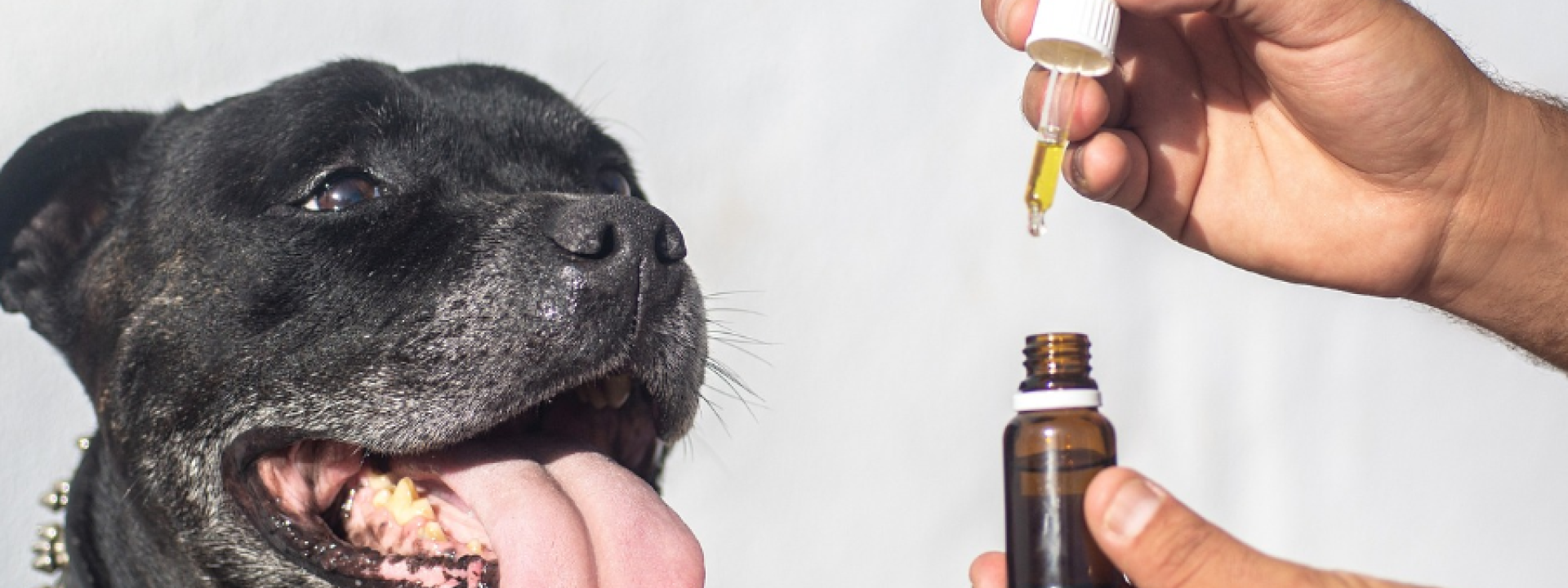
Katy Pet Wellness Solutions
September 2022
In recent years, there has been an increase in hemp products or those containing CBD due to the FDA changing the way these products are categorized and allowing for legal growth and use of them. There are a lot of points to consider regarding if they are safe for pets, how they may help, risk factors and side effects that may occur, and overall legality of use in pets.
It is important to know the difference in the products used. Hemp products (CBD-dominant cannabis), those deemed legal to grow and use, are those that contain less than 0.3% TCH (Δ9-tetrahydrocannabidiol) whereas marijuana (THC-dominant cannabis) which is only legal in certain areas contains more than 0.3% TCH1. With low THC content, hemp products reduce the risk off marijuana toxicity (more on this later) but it’s important to note that some of these products may still contain THC, even at low levels. Hemp products have a long history of a variety of uses, but most recently, products containing CBD (cannabidiol) have become the more popular as a supplement in humans and pets and come with a wide variety of claims for improving a number of conditions.
Research shows CBD supplementation is promising in certain situations in pets, however, there are still limitations to its use and still a lot left unknown. To date, most studies done on the efficacy of CBD products in pets have focused on chronic pain and seizure control2. Aside from some safety studies, very few other studies have been done in other areas with regards to pets that are often claimed to benefit from CBD supplementation such as in cases of anxiety, gut health, immune health, mental clarity, acute pain, etc. While continued testing is ongoing, there is still a long way to go. CBD and hemp product research is still in its infancy. Since the mechanism as to how it works in some cases is still unclear, certain side effects continue to be present in multiple studies3, most studies have not been conducted long term2, and many areas are still left unexplored2, large-scale recommendation for use of these products is still some time away. Additionally, the legal changes allow for the use of hemp in humans only and does not reference legalization of use in pets3. In fact, many state veterinary boards do not allow veterinarians to discuss CBD products with their clients nor dispense them4 despite many products being labeled and marketed for pets.
Given their popularity and wide availability it may be surprising to discover that CBD products are not controlled by the FDA and therefore lack regulation2,4. As such, there is wide variability in quality2, composition5, and efficacy of various hemp-derived products – some not even containing the ingredients claimed or in the quantities claimed5 and product labels may contain incorrect dosing information2. The closest organization to creating oversight for veterinary (pet) supplements and nutraceuticals is the National Animal Supplement Council which provides its seal for products that meet its standards for quality control, stringent label compliance, and random product testing among other criteria.
As hinted at previously, no discussion about CBD and hemp products is complete without a commentary regarding risks of marijuana toxicity. Given that many human products may contain THC in addition to the use of it recreationally, pets are left at risk of toxicity through inhalation or ingestion6. It’s been stated that dogs are uniquely sensitive to the effects of THC4 and a 2021 report from BluePearl found that marijuana toxicity is the second leading cause of toxicity after chocolate and may surpass chocolate toxicity by 20237. While hemp-derived products may be of low risk to the negative effects of marijuana toxicity, increasing access to THC-dominant cannabis (marijuana) can lead to ingestion. Symptoms of toxicity may include ataxia (instability), body tremors, drooling, bradycardia (decreased heart rate), hypothermia, incontinence, seizures, and tachycardia (increased heart rate)8. Pets may also appear hypersensitive to stimulus and sounds. While no human deaths have been reported related to THC toxicity, there have been reports of deaths in dogs4. Any pet that has been exposed to THC-dominant cannabis needs to see a veterinarian and the exposure needs to be disclosed immediately so appropriate treatment may be administered. Because of the risks of drug interactions and contraindications of various medications and conditions, it is of utmost importance that the vet has all the information needed for the best chance of recovery.
Unfortunately, at this time, despite apparent legal lifts on cannabis restrictions, there is too much unknown to view hemp-derived products as appropriate treatments for various conditions. While current and ongoing research is promising, the lack of more in-depth research and regulations means CBD uses are worth noting, but at this time are best left to the scientists and their ongoing studies and hemp-derived products in the home should be stored out of reach of pets.
References
- "Hemp Oil and Cannabidiol: What Clinicians Should Know." Clinician's Brief, 1 Mar. 2020, www.cliniciansbrief.com/article/hemp-oil-cannabidiol-what-clinicians-should-know.
- Wakshlag, MS, DVM, PhD, DACVN, DACVSMR, Joseph. "CBD: Another Popstar with an Entourage." Webinar.
- Fischer, DVM, DACVAA, CCRP, CVA, Berit. "Evaluating CBD Safety in Dogs." Clinician's Brief, 1 Mar. 2022, www.cliniciansbrief.com/article/evaluating-cbd-safety-dogs.
- Silver, DVM, MS, Robert. "Veterinary Medical Cannabis: Applications and Regulatory Aspects." American Bar Association, 23 Jun. 2021, www.americanbar.org/groups/senior_lawyers/publications/voice_of_experience/2021/voice-of-experience--june-2021/veterinary-medical-cannabis--applications-and-regulatory-aspects/.
- Wakshlag, Joseph, et al. "Cannabinoid, Terpene, and Heavy Metal Analysis of 29 Over-the-Counter Commercial Veterinary Hemp Supplements." Veterinary Medicine: Research and Reports, 2020, https://doi.org/10.2147/VMRR.S248712.
- "Marijuana Intoxication in a Pit Bull." Clinician's Brief, 1 Apr. 2019, www.cliniciansbrief.com/article/marijuana-intoxication-pit-bull.
- "Study predicts marijuana toxicity with overtake chocolate toxicity by 2023." DVM360, 24 Feb. 2022, www.dvm360.com/view/study-predicts-marijuana-toxicity-will-overtake-chocolate-toxicity-by-2023.
- "Marijuana Toxicity on the Rise Among Pets." DVM360, 13 Jul. 2018, www.dvm360.com/view/marijuana-toxicity-on-the-rise-among-pets.
